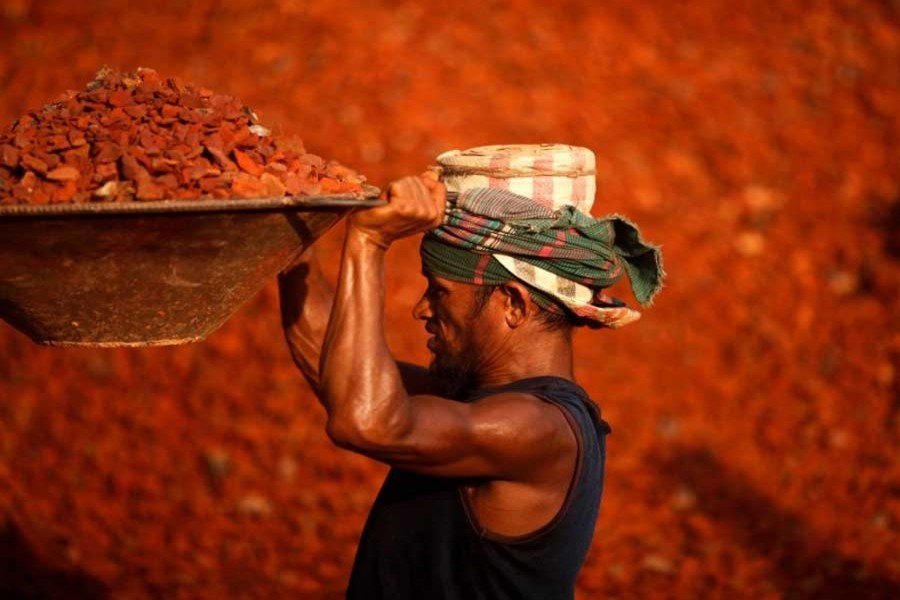In South Asia, three-quarters of workers depend on informal employment. The informal economy of Bangladesh constitutes of 86.2 per cent of the total employed population (aged 15 years or older) (Labour Force Survey, 2015-2016). The proportion of informal employment is higher for females compared to their male counterparts, at 95.4 per cent and 82.3 per cent, respectively. Further, the poor are more likely to be employed in informal sectors such as agriculture (mostly as labourers), construction, and transport. It thus shows how closely related the lives of the poor are to the informal sectors of the economy and how critical employment in these sectors is for poverty reduction and women’s economic empowerment. The COVID-19 pandemic has hit almost all sectors of Bangladesh’s economy, albeit in different magnitudes. The economy has been recovering since the withdrawal of the lockdown. However, available evidence indicates that the recovery of informal sectors is relatively slow compared to the formal ones.
A study conducted by the Power and Participation Research Centre (PPRC) and the BRAC Institute of Governance and Development (BIGD) at BRAC University shows that in April 2020, when the lockdown was in force, formal sector workers (RMG workers, peons etc.) suffered a lesser income drop compared to informal sector workers (restaurant workers, day labourers, rickshaw pullers etc.). The study also finds that in June 2020 (i.e. after the lockdown was lifted), the unemployment rate was highest (54 per cent) among housemaids, followed by skilled/unskilled workers (18-20 per cent), small businessmen (17.2 per cent), and transport workers (16.7 per cent), compared to 17.2 per cent among all workers. The unemployment rate among agricultural workers was, however, very low (10 per cent). Furthermore, earnings drop between February and June 2020 was, on average, 49 per cent for most informal occupations compared to a 17 per cent drop for formal occupations. These statistics suggest that informal sectors are slowly recovering compared to the formal ones. The PPRC-BIGD study also reveals that uncertainty about the future is higher among those employed in informal sectors. For example, around 84 per cent of small businessmen and housemaids reported that they were uncertain about the future of their business/occupations compared to 53 per cent among salaried workers.
What are the reasons for the slow recovery of informal sectors? Several large informal sectors such as transport, domestic service and small business slowed down dramatically during the lockdown. After withdrawing the lockdown, they started to recover, albeit slowly. The transport sector is slowly recovering (17 per cent unemployment in this sector in June 2020 as per the PPRC-BIGD study) mainly because: (i) educational institutions are either closed or taking online classes, (ii) employees of many formal sectors are working from home, and (iii) older people who are highly at risk of COVID-19 infections are mostly staying home. On the other hand, the unemployment rate among housemaids remained very high after withdrawing the lockdown perhaps because households are less likely to employ any part-time maids until the situation normalises. Small business is also slowly recovering because due to a large income drop (62-75 per cent and 41-43 per cent drop in April 2020 and June 2020 respectively compared to February 2020 as per the PPRC-BIGD study) purchasing power of households has declined. Further, according to a study by CGAP (Consultative Group to Assist the Poor), although the government’s stimulus plan included the provision of working capital funds to SMEs, a large proportion of them could not avail it, as many did not have links and formal accounts at the banks distributing the funds.
It is evident that due to the COVID-19 pandemic, around 324,684 workers of the RMG sector, the biggest formal sector employer in the country, lost jobs whereas the total employment in this sector (before COVID-19 hit) was about 4.2 million. So, due to COVID-19, around 8 per cent of RMG workers have become unemployed. Since the average household income declined by 20 per cent during March-August 2020 at the national level as per BBS survey, the 8 per cent reduction in employment in the RMG sector is not very high. A large amount of government support for this sector (stimulus package of 13 billion USD for the garment and related industries) perhaps contributed to a lower job cut in this formal sector.
Although Bangladesh has made remarkable progress in terms of poverty reduction (40 per cent to 24.3 per cent during 2005-2016 according to BBS), making its way to graduate to a middle-income country in 2024, the COVID-19 has largely reversed the progress made. Ensuring faster recovery of the informal economy will help decrease the rate of poverty. While immediate reliefs and stimulus packages have helped cushion some of the impacts in Bangladesh, the government needs to undertake employment generation programs. Increasing informal employment in urban areas by allowing flea markets on selected roads during the weekend can be considered. In the longer term, digital technologies can play an even crucial role in generating new opportunities for informal workers. A study by BIGD on the case of online female entrepreneurs showed resilience among female entrepreneurs who were able to downsize, reduce their costs, and be adaptive in their coping mechanisms due to their businesses being online. Urban slum households, who are mostly poor, are predominantly employed in informal sectors. To help them cope with the pandemic, their house rents and utility bills may be decreased through appropriate governance mechanisms. Access to low-interest credits may be an effective policy. In this regard, the government may engage NGOs that have reputations to disburse credits to the poor. For all those who have lost jobs, and even those in the informal sector whose earnings have dropped, providing appropriate training can be effective.
Dr Narayan Das and Asma Tabassum are Researchers at the BRAC Institute of Governance and Development (BIGD), BRAC University


